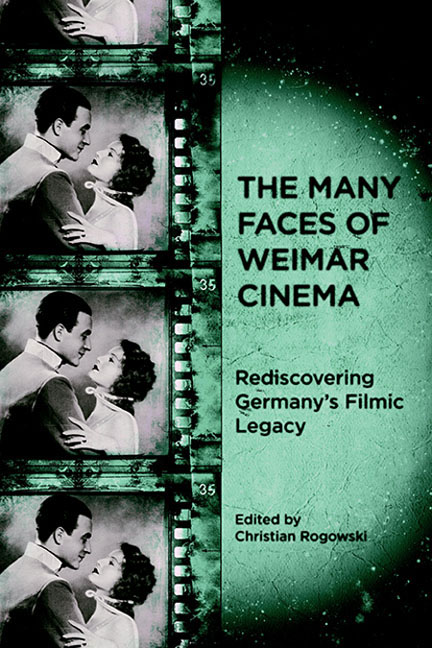Book contents
- Frontmatter
- Contents
- List of Illustrations
- Preface
- Introduction: Images and Imaginaries
- 1 Richard Oswald and the Social Hygiene Film: Promoting Public Health or Promiscuity?
- 2 Unsettling Nerves: Investigating War Trauma in Robert Reinert's Nerven (1919)
- 3 Humanity Unleashed: Anti-Bolshevism as Popular Culture in Early Weimar Cinema
- 4 Desire versus Despotism: The Politics of Sumurun (1920), Ernst Lubitsch's “Oriental” Fantasy
- 5 Romeo with Sidelocks: Jewish-Gentile Romance in E. A. Dupont's Das alte Gesetz (1923) and Other Early Weimar Assimilation Films
- 6 “These Hands Are Not My Hands”: War Trauma and Masculinity in Crisis in Robert Wiene's Orlacs Hände (1924)
- 7 The Star System in Weimar Cinema
- 8 Schaulust: Sexuality and Trauma in Conrad Veidt's Masculine Masquerades
- 9 The Musical Promise of Abstract Film
- 10 The International Project of National(ist) Film: Franz Osten in India
- 11 The Body in Time: Wilhelm Prager's Wege zu Kraft und Schönheit (1925)
- 12 Henrik Galeen's Alraune (1927): The Vamp and The Root of Horror
- 13 The Dialectic of (Sexual) Enlightenment: Wilhelm Dieterle's Geschlecht in Fesseln (1928)
- 14 Babel's Business — On Ufa's Multiple Language Film Versions, 1929–1933
- 15 “A New Era of Peace and Understanding”: The Integration of Sound Film into German Popular Cinema, 1929–1932
- 16 Landscapes of Death: Space and the Mobilization Genre in G. W. Pabst's Westfront 1918 (1930)
- 17 Undermining Babel: Victor Trivas's Niemandsland (1931)
- 18 Unmasking Brigitte Helm and Marlene Dietrich: The Vamp in German Romantic Comedies (1930–33)
- Filmography
- Notes on the Contributors
- Index
5 - Romeo with Sidelocks: Jewish-Gentile Romance in E. A. Dupont's Das alte Gesetz (1923) and Other Early Weimar Assimilation Films
Published online by Cambridge University Press: 29 April 2017
- Frontmatter
- Contents
- List of Illustrations
- Preface
- Introduction: Images and Imaginaries
- 1 Richard Oswald and the Social Hygiene Film: Promoting Public Health or Promiscuity?
- 2 Unsettling Nerves: Investigating War Trauma in Robert Reinert's Nerven (1919)
- 3 Humanity Unleashed: Anti-Bolshevism as Popular Culture in Early Weimar Cinema
- 4 Desire versus Despotism: The Politics of Sumurun (1920), Ernst Lubitsch's “Oriental” Fantasy
- 5 Romeo with Sidelocks: Jewish-Gentile Romance in E. A. Dupont's Das alte Gesetz (1923) and Other Early Weimar Assimilation Films
- 6 “These Hands Are Not My Hands”: War Trauma and Masculinity in Crisis in Robert Wiene's Orlacs Hände (1924)
- 7 The Star System in Weimar Cinema
- 8 Schaulust: Sexuality and Trauma in Conrad Veidt's Masculine Masquerades
- 9 The Musical Promise of Abstract Film
- 10 The International Project of National(ist) Film: Franz Osten in India
- 11 The Body in Time: Wilhelm Prager's Wege zu Kraft und Schönheit (1925)
- 12 Henrik Galeen's Alraune (1927): The Vamp and The Root of Horror
- 13 The Dialectic of (Sexual) Enlightenment: Wilhelm Dieterle's Geschlecht in Fesseln (1928)
- 14 Babel's Business — On Ufa's Multiple Language Film Versions, 1929–1933
- 15 “A New Era of Peace and Understanding”: The Integration of Sound Film into German Popular Cinema, 1929–1932
- 16 Landscapes of Death: Space and the Mobilization Genre in G. W. Pabst's Westfront 1918 (1930)
- 17 Undermining Babel: Victor Trivas's Niemandsland (1931)
- 18 Unmasking Brigitte Helm and Marlene Dietrich: The Vamp in German Romantic Comedies (1930–33)
- Filmography
- Notes on the Contributors
- Index
Summary
The First World War and its aftermath saw an increase in the mass migration of Eastern Jews to the cities of Western Europe, triggering a rise in anti-Semitism. If earlier generations had fled persecution in Tsarist Russia and the border provinces of the Hapsburg Empire, these new migrants were now trying to escape the chaos engendered by the Russian Revolution and the collapse of the Austro-Hungarian Empire. Mostly Orthodox Jews with distinctive dress, beliefs, and customs, they became a visible foreign presence on the streets in the West. Traditional and unmodernized, they also represented “brothers and strangers” to assimilated urban Jews in places such as Berlin and Vienna, who received them with ambivalence.
Released in 1923, Das alte Gesetz (Ancient Law), by director Ewald André Dupont, reenacts the migration of Jews from Eastern Europe to the capital of the Austrian Empire in the 1860s through the journey of Baruch Mayer, an Orthodox Jew and aspiring actor, from a shtetl in Galicia to the stage of Vienna's preeminent theater, the Burgtheater. There his career is promoted by a benefactor at the imperial court, whose interest in the young actor is not just artistic but also romantic. Archduchess Elisabeth Theresia is smitten by his performance in Shakespeare's Romeo and Juliet, despite the signature Orthodox sidelocks that tumble out of his cap, creating a scandal in the court audience.
I propose to examine Das alte Gesetz along with three other feature films made in Germany and Austria between 1919 and 1924 — Der Ritualmord (Ritual Murder, directed by Joseph Delmont, 1919), Der Golem, wie er in die Welt kam (The Golem, How He Came into the World, directed by Paul Wegener, 1920), and Die Stadt ohne Juden (The City without Jews, directed by Hans Karl Breslauer, 1924) — where a potential romantic relationship between Jew and Gentile functions as a metaphor for the possibilities and limits of assimilation. Responding to waves of Jewish refugees fleeing Eastern Europe in the wake of the First World War, these films represent cinematic interventions in the ongoing German debate about die Judenfrage (the Jewish question) during a period of escalating anti-Semitism that fomented xenophobia about immigration and fear of miscegenation. In this environment sexual relations between Jews and Gentiles became charged with taboo (if only for a vocal minority as yet), and inter-ethnic intimacy potentially signified transgressive interracial romance.
- Type
- Chapter
- Information
- The Many Faces of Weimar CinemaRediscovering Germany's Filmic Legacy, pp. 84 - 101Publisher: Boydell & BrewerPrint publication year: 2010

